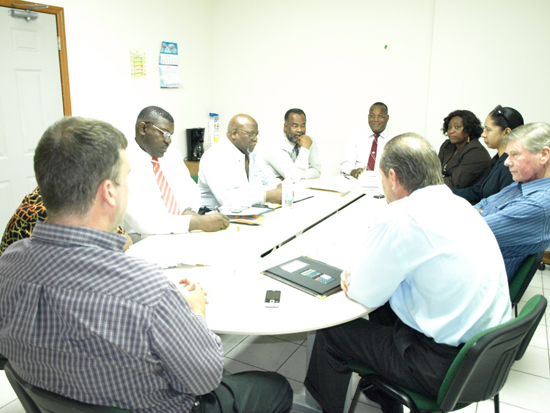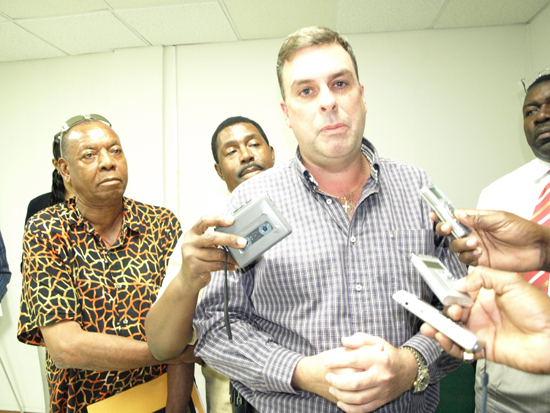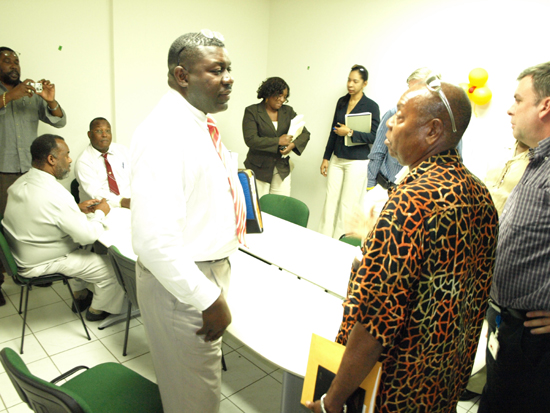 Philipsburg:--- The tripartite committee has decided to monitor the effects of the new labor policy which would take effect on January 12 2009 says President of the Chamber of Commerce Glen Carty. Carty made the statements just after the conclusion of the three hour long tripartite meeting which was held yesterday evening. Carty said the meeting was fruitful and they have agreed to disagree by partly endorsing the policy. "We have agreed to use this as a starting point."
Philipsburg:--- The tripartite committee has decided to monitor the effects of the new labor policy which would take effect on January 12 2009 says President of the Chamber of Commerce Glen Carty. Carty made the statements just after the conclusion of the three hour long tripartite meeting which was held yesterday evening. Carty said the meeting was fruitful and they have agreed to disagree by partly endorsing the policy. "We have agreed to use this as a starting point."
He said the intention is for them is to monitor the effects of the policy and make the necessary changes if possible as they go along. The chamber president said he felt the procedure started off on the wrong foot since the meeting that was held yesterday should have held before the policy was released to the media. Carty said they had a number of questions since everything was not clear to them and those questions he said was answered and they can live with the explanations given.
Furthermore, they have agreed to work together since all three of them have their role to play in the community. "Without business there is no labor and without labor there is no business and when there is neither of the two there is no government. So based on this fact the tripartite has to work in the best interest of the island which is to create their own home grown employees to fill the demands of the labor market." The chamber president said.
 Carty said while they applaud the labor department for modernizing and properly structuring itself they are concerned with the fact the process will not be slowed down by the decision makers within the department. The Chamber president said they also agreed that some level of education has to be upgraded and trainings have to be provided for the islands people which would enable the business sector to fill the vacancies when it becomes available.
Carty said while they applaud the labor department for modernizing and properly structuring itself they are concerned with the fact the process will not be slowed down by the decision makers within the department. The Chamber president said they also agreed that some level of education has to be upgraded and trainings have to be provided for the islands people which would enable the business sector to fill the vacancies when it becomes available.
However, he made clear that the private sector is not to be blamed for the influx of foreigners or illegal workers instead it was created by years of neglect from the labor department. He said while this is the cause for government to bring on a more stringent policy it was their own fault since the policy they had before could have worked perfectly if it was properly implemented. "If one can take a survey they would find a lot of people who did not need to get a working permit since the vacancy could have been filled by home grown workers but it is government who issued these permits and not the private sector." Carty said the chamber is still looking into getting more data since the only way for them to negotiate is based on quotas. He said they were told unemployment rate today stands at 10% but they need to know what percent are really locals. Locals for him are holders of Dutch Antillean passports.
Speaking on behalf of the Unions, Willy Haize of the United Front Chamber of Labour Unions and the UFA said he fully endorsed the policy since it is high time for government to give locals first preference while the Dutch Antilleans first second and the Dutch national third preference. He said after that consideration will be given to those with permanent residence while other foreign workers must follow the guidelines that are set down by government. Reason behind this attitude Haize said a lot of abuse has been taking place which has to now stop. The unionist felt very strongly that employers must contribute towards proper housing for their employees as well as their education. Haize said he feels that employers should not hide from their responsibilities since they are fully responsible for the influx of foreign labor. "These very companies who are complaining today are the ones who bring in the foreign labors to exploit and abuse." However, with a stringent policy such as this one there would be some sort of control on the influx of foreign labor. Haize explained.
Asked what would the unions do to make sure the policy is implemented and not serve as a paper trail? Haize said that they did discuss these issues and the employers now have to educate their employees on the job. He said government also needs money also educate its people.
Haize said many persons have been talking about the steep increase in the fees but he feels government do need money to provide the necessary training for its youths so they are not considered as lazy, something he totally disagrees with since St. Maarten youths are not given the opportunity to excel and prove themselves. "On the contrary because the youths are not given a fair opportunity in the job market they turn to crime." Haize said.
Asked if government would look into the ways and means to eliminate the consultancy agencies that are charging for their services to fix papers and allow the foreign workers or their employers to deal directly with the labor department. Haize said employers have to process these documents while the employees remain off island and their would be some stricter control over the processing.
Head of the island labor department Raphael Boasman said the policy is very practical and it was set up based on the data they have collected over the years.  Asked why there was the drastic increase in the processing fee? Boasman said the island government needs money to sustain and maintain the department since processing of working permits is very costly for the island government. "There are 15 employees working at the labor department." Asked if the processing fees will be refunded if the permit is denied? Boasman said government idea is to limit the amount of foreign labor to the island. He said the reason they have decided to drastically increase the fees was to create some sort of deterrent from foreign workers and or employers. However, he said the fees that are requested are among the cheapest in the Caribbean islands. "Even though this is a drastic increase for St. Maarten, the island is still one of the cheapest within the Caribbean region." Asked if this policy is acceptable in Holland; since there is no processing fee in the Kingdom? Boasman said he simply do not know what is the law in Holland since he does not live and work for that country instead he is working for the island government of St. Maarten. Furthermore he does not think one should compare this policy to that of Holland since the Kingdom in his opinion does not have the same immigration problems as St. Maarten.
Asked why there was the drastic increase in the processing fee? Boasman said the island government needs money to sustain and maintain the department since processing of working permits is very costly for the island government. "There are 15 employees working at the labor department." Asked if the processing fees will be refunded if the permit is denied? Boasman said government idea is to limit the amount of foreign labor to the island. He said the reason they have decided to drastically increase the fees was to create some sort of deterrent from foreign workers and or employers. However, he said the fees that are requested are among the cheapest in the Caribbean islands. "Even though this is a drastic increase for St. Maarten, the island is still one of the cheapest within the Caribbean region." Asked if this policy is acceptable in Holland; since there is no processing fee in the Kingdom? Boasman said he simply do not know what is the law in Holland since he does not live and work for that country instead he is working for the island government of St. Maarten. Furthermore he does not think one should compare this policy to that of Holland since the Kingdom in his opinion does not have the same immigration problems as St. Maarten.
In clarifying a statement he made to one of the media houses. Glen Carty said they are busy looking into the situation where a number of immigrant workers are not paying taxes on St. Maarten. Carty said it is either the taxes are deducted by the employers and are withheld or either these foreign and illegal workers are simply not contributing to the island instead they are shipping their monies back home. Carty said even though he understands that these people may have families back home to support they need to financially contribute to the island where they are making their monies. "Immigration and taxes should not go together, if you are illegal and working you should contribute towards the island. In the good times St. Maarten could have afforded to let this go but now there is a world wide economic crisis, the chamber of commerce is looking for methods where the monies that are made from tourism should remain circulating locally. He said these methods will not only include the taxes but instead they are going have to introduce a method where even the government would have to purchase their goods locally to stimulate the local businesses and the economy." Carty clarified.












